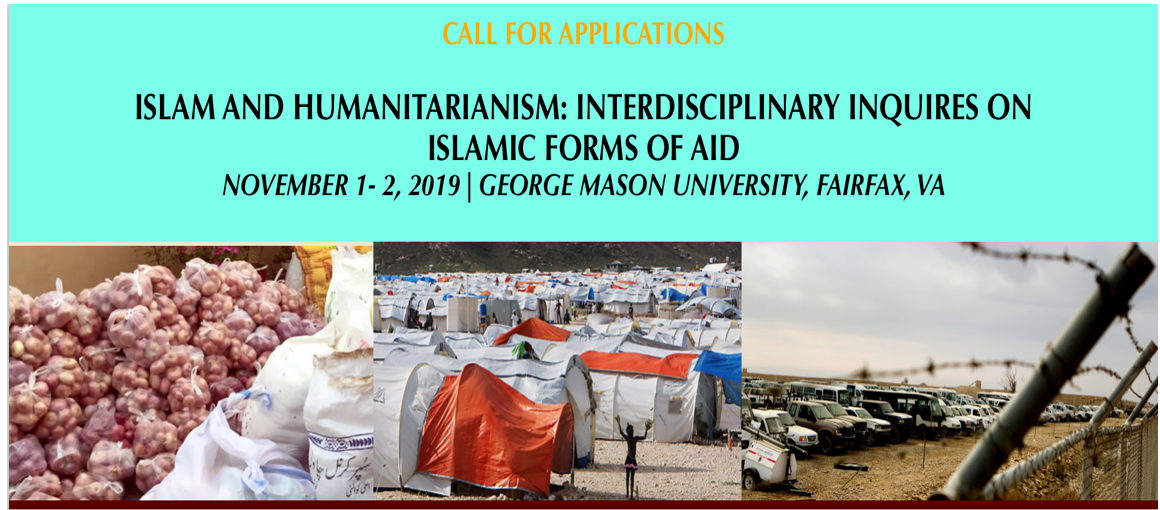
Islam and Humanitarianism: Interdisciplinary Inquiries on Islamic Forms of Aid
Call for Applications
November 1-2, 2019 | Fairfax, VA
Ali Vural Ak Center for Global Islamic Studies at George Mason University
[Extended] Submission Deadline: September 30, 2019
Humanitarianism has long been understood and approached as a secular endeavor that has roots in modern Western traditions of liberalism and cosmopolitanism. Efforts by various Muslim actors to provide aid have often been looked down upon as particularistic or even missionary undertakings with hidden political agendas that are completely caught up in local and regional geopolitical interests. Even in less condescending accounts, assistance by Muslim actors have been framed as merely localized charity or philanthropy targeting extreme poverty. In the last decade, the rapid growth of the influence of transnational and local Muslim actors who actively participate in the global humanitarian sector as a response to massive displacement and refugee crises in many parts of the world invites us to reconsider Islamic forms of aid as more than mere charity. In addition to the emergence of transnational organizations such as Islamic Relief as major global actors in humanitarian assistance, many local organizations led by Muslims have increasingly been making claims to being recognized as humanitarian actors who could care for and help all human beings regardless of faith, race, gender, or any other such consideration.
This conference proposes an interdisciplinary framework for unpacking the link between Islam and humanitarianism in ways that recognize both the significance of geopolitics, policy-making, and transnational partnerships and the lived experiences of giving and receiving help that are articulated in diverse contexts of suffering. It proposes a nuanced study of Islamic humanitarianism using an intersectional approach, i.e., the multifaceted ways in which categories such as state, race, nationalism, sectarianism, class, gender, space, and age shape the ways in which Islam interacts with humanitarianism.
It will bring together scholars from diverse disciplines of social sciences and humanities to discuss empirical, historical, and conceptual issues related to these matters and their potentially far-reaching implications. Putting into conversation rigorous research focusing on different parts of the globe, we plan to address following themes:
- Defining and Conceptualizing “Islamic” Humanitarianism: Which Muslim political and social actors claim to be humanitarian, in what contexts, and to what effects? How do they understand terms such as “the human,” “humanity,” or “humanitarianism?” In what ways do their practices of humanitarian aid differ from other practices of charity work and civil society activities? What analytical frameworks can we develop to understand Islamic cosmologies, genealogies, or theologies of aid, help, and humanness? What theories and concepts can we employ to interpret Islamic forms of humanitarianism?
- Historical Cases and Islamic Cosmologies of Aid:What are the specific historical settings in which Islam has been invoked as a major point of reference to encourage giving? What types of historical processes have informed the emergence and transformation of Islamic discourses of giving in different parts of the world? In what ways have diverse political and economic actors in imperial and nation-state regimes become involved in practices of giving and aid, particularly in situations of wars and displacement? How do different interpretations of Islam such as Sufism historically inform Islamic practices of giving? In what ways do diverse historical actors frame the relationship between religion/faith and humanitarianism?
- Contextualizing Muslim Humanitarians in Globalized World: How do broader histories of colonialism, imperialism, the war on terror, modernization, and development shape the emergence of Muslim humanitarian actors and policies? How do current global and regional histories of violence, war, and displacement inform Islamic cosmologies of aid? How does the local politics of Muslim aid intersect with transnational processes such as capitalism, nationalism, and authoritarianism? What types of collaborations exist between diverse groups of secular and Islamic humanitarian actors ranging from the UN to local mosques? How do transnational and local NGOs participate in this process of collaboration?
- Everyday Politics of Humanitarianism by Muslims: How do analytical categories such as class, race, and gender shape everyday practices of humanitarianism by Muslims? How is power distributed among different actors in everyday life and to what effects? Can we speak of Islamic humanitarian expertise? If so, what types of claims to universalism and moral authority are enacted in the process? What types of existing hierarchies are reinforced and what new hierarchies are formed within complex processes of giving and taking? What is the conversation between secular and Islamic discourses in everyday life of humanitarianism? How do Muslim actors draw upon secular and religious vocabularies of humanitarianism in their everyday work?
Submissions should include:
- A 250-300 word abstract
- A 2 page max CV/Resume
Submissions should be emailed to Conference Convener Dr. Yasemin Ipek, Asst. Professor, GMU Global Affairs Program (yipek@gmu.edu)
Timeline:
Submission Deadline: September 30, 2019
Notification of selected papers: October 4, 2019
Submission of Final Papers: October 24, 2019
The Ali Vural Ak Center for Global Islamic Studies at George Mason University will host the Conference at George Mason University’s Fairfax Campus. Participants are expected to arrange and cover their own travel and accommodation expenses.


